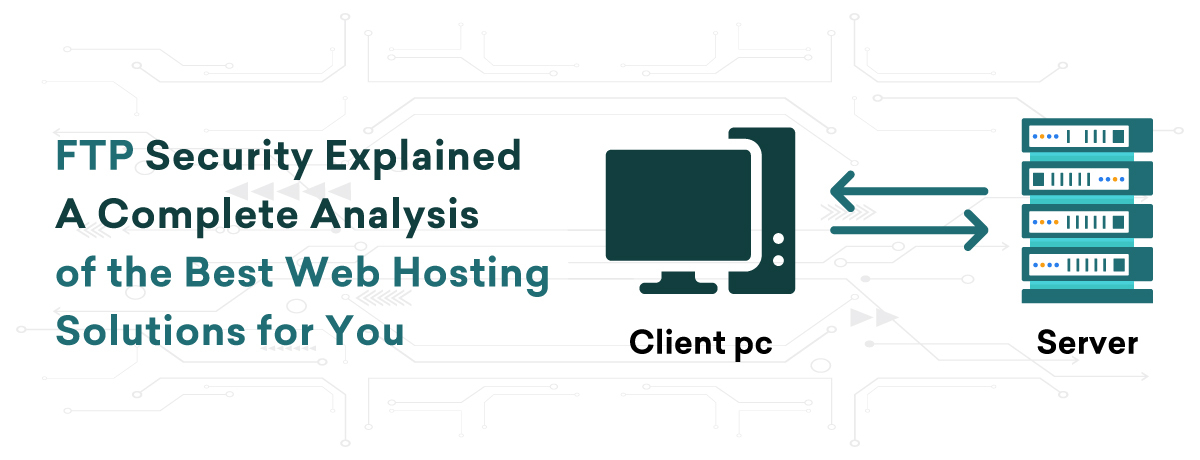Understanding FTP: An Overview
A common network protocol called File Transfer Protocol (FTP) is used to send files over the Internet between a client and a server. It is an essential tool for best web hosting and website management since it is frequently used for uploading and downloading data to and from web servers. Still, there has long been worry about FTP security in the digital world.
In its most basic form, file transfer protocol (FTP) transfers data in plain text, which leaves it open to interception and attack by cybercriminals. This includes usernames and passwords. This lack of encryption puts sensitive data at serious danger of illegal access and data breaches. Secure substitutes like SFTP (SSH File Transfer Protocol) and FTPS (FTP Secure) have been created to allay these worries. Whereas SFTP offers secure file transfer via the SSH protocol, guaranteeing data confidentiality and integrity, FTPS uses SSL/TLS encryption to add an extra layer of protection.
It is important to take into account the security features offered, such as support for secure file transfer protocols, while selecting the best web hosting package. Strong security features, like encrypted connections, frequent backups, and sophisticated firewalls, are provided by reputable and the best web hosting companies to safeguard your information and guarantee secure file transfers.
Furthermore, a lot of contemporary web hosting packages come with intuitive user interfaces and extensive support for safe file transfer techniques, which let you run your website effectively while upholding strict security guidelines. You can protect your data and guarantee the seamless functioning of your online presence by being aware of the significance of FTP security and choosing the best web hosting companies that place a high priority on secure file transfer protocols.
Effective Strategies for Data Security
File Transfer Protocol (FTP) is essential for transferring files between a client and a server over the Internet, making it a key component in the best web hosting and website management. However, traditional FTP has notable security vulnerabilities, primarily due to its transmission of data in plain text, which can be easily intercepted by malicious actors. Understanding and implementing secure file transfer methods is critical for protecting your data.
Secure Alternatives to FTP:
- FTPS (FTP Secure): FTPS enhances traditional FTP by incorporating SSL/TLS encryption, ensuring that data transferred between the client and server is encrypted and secure. This added layer of protection helps prevent unauthorized access and data breaches.
- SFTP (SSH File Transfer Protocol): SFTP provides secure file transfer capabilities over the SSH protocol. Unlike FTP, SFTP encrypts both commands and data, offering a higher level of security and making it a preferred choice for many web administrators.
Best Practices for Securing Your Data:
- Choose a Secure and The Best Web Hosting Provider: Opt for web hosting providers that prioritize security and support secure file transfer protocols like FTPS and SFTP. Look for additional security features such as advanced firewalls, regular backups, and malware scanning.
- Enable Encryption: Always use encrypted connections when transferring files. Both FTPS and SFTP offer robust encryption, ensuring that your data remains secure during transit.
- Use Strong Authentication: Implement strong authentication methods, such as public key authentication for SFTP, to enhance security. Avoid using simple passwords and consider multi-factor authentication (MFA) for an added layer of protection.
- Regularly Update Software: Keep your FTP client and server software updated to the latest versions. Regular updates often include security patches that address known vulnerabilities.
- Monitor and Audit: Regularly monitor your file transfer activities and audit logs to detect any unusual or unauthorized access attempts. Early detection can help prevent potential security breaches.
By understanding the importance of FTP security and implementing these best practices, you can significantly enhance the protection of your data. Secure file transfer protocols and robust and the best web hosting solutions are essential components in maintaining the integrity and confidentiality of your online operations.
Conclusion
Ensuring the security of your data during file transfers is crucial. By understanding FTP and its secure alternatives like FTPS and SFTP, you can make informed decisions about your web hosting needs. Opt for providers that prioritize security, and implement best practices to protect your data, ensuring a robust and secure online presence.








